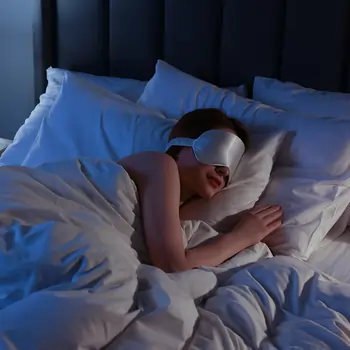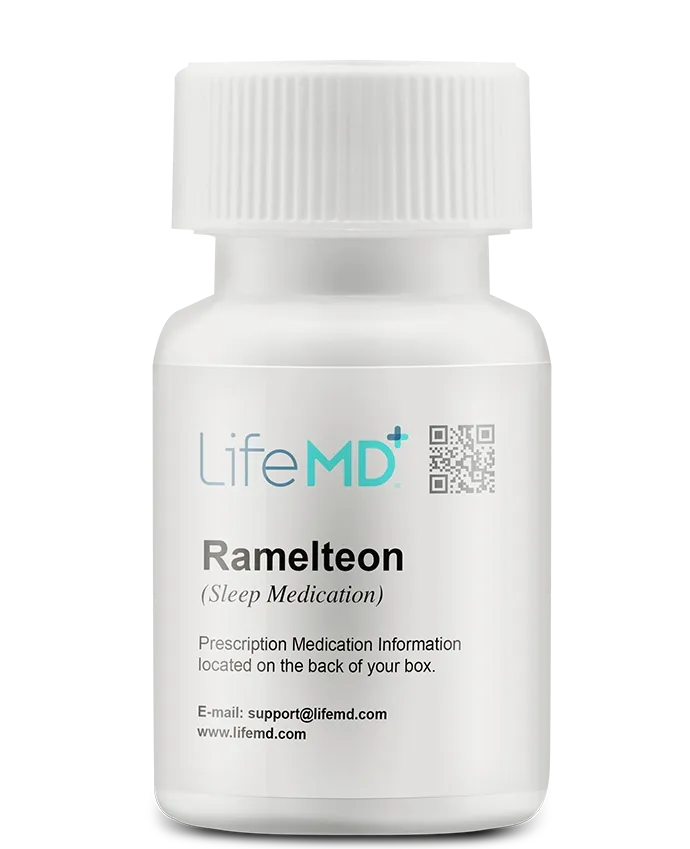Rare Sleep Disorders: Causes, Symptoms, and Treatments
Sleep disorders are disruptive conditions that can impact the quality of a night’s rest and may result in other serious health issues.
These include an increased risk of developing heart conditions, depression, hypertension, or other chronic diseases like diabetes.
The National Sleep Foundation estimates that over 70 million Americans live with chronic sleep disorders.
Although many people experience sleep disorders, some sleep disorders are rare. These disorders can be life-threatening and difficult to deal with if you don’t know where to start looking for treatment options.
In this article, we’ll take a closer look at rare sleep disorders, including how you can manage and treat your symptoms.
Tired of restless nights?
Don’t let insomnia hold you back. Take the first step towards better sleep with LifeMD.


What is a Sleep Disorder?
A sleep disorder is a condition that impairs the quality, timing, and amount of rest you get each night.
It can cause daytime sleepiness, distress, and impaired bodily functions. Sleep disorders may also prevent you from performing regular daytime activities due to extreme feelings of fatigue.
How much sleep do I need?
The National Sleep Foundation recommends that adults get between seven to eight hours of sleep per night.
People over 65 should also try to get seven to eight hours of sleep per night.
Not getting enough sleep does not necessarily increase your risk of developing a sleeping disorder, but prolonged deficiency may result in other chronic health-related problems.
These include:
Heart disease
Kidney disease
Diabetes
Obesity
Depression
Common signs and symptoms of sleep disorders
It can be difficult to distinguish between the early signs of a sleep disorder and the odd restless night.
Symptoms of sleep disorders include:
Excessive daytime sleepiness
Irregular breathing or increased movement during sleep
Difficulty falling asleep
Memory difficulties
Struggling to stay awake when doing things like watching television or reading
Difficulties with paying attention or concentrating
Having to take frequent naps to make it through the day
Feeling tired during the day or occasionally struggling to fall asleep isn’t always an indication that you have a sleep disorder. These symptoms should be assessed by a healthcare professional.
What Causes a Sleep Disorder?
Sleeping disorders can be caused by a number of factors that can result in a disturbed sleep cycle.
These conditions have been linked to mental health issues, often occurring alongside conditions like depression and anxiety.
A sleep disorder can also be linked to:
Chronic pain
Heart disease
Digestive disorders like acid reflux and gastroesophageal reflux disease (GERD)
Parkinson’s or Alzheimer’s disease
An overactive thyroid
Certain types of cancer
Other factors that can contribute to sleep disorders include:
Drinking alcohol
Medications
Age
Genetics
Working night shifts that continuously disrupt the body’s biological clock
Perimenopause (the time during which the body makes the natural transition to menopause) and menopause
Can I Die From a Sleep Disorder?
A sleep disorder can cause sleep deprivation which in turn may cause life-threatening events, such as falling asleep while driving.
Sleep deprivation is caused by a consistent lack of or reduced sleep quality. When we sleep, the body has a chance to repair itself and restore chemical imbalances.
That’s why regularly getting less than the recommended seven to eight hours of sleep can severely impact your health.
Other than daytime drowsiness, sleep deprivation can also contribute to:
Delayed decision-making
Mood swings
Mental health issues
Memory issues
Trouble with concentrating and thinking
Weakened immunity
Increased risk of causing car or other accidents due to falling asleep
High blood pressure
Weight gain
Increased risk of developing diabetes and heart disease
Low sex drive
What are the Rare Sleep Disorders?
Although there’s a lot of information on common sleep disorders, some people suffer from lesser-known conditions.
These disorders are rare and difficult or impossible to treat since it can be challenging to find their cause.
Let’s take a look at what these rare sleep disorders are.
Fatal familial insomnia (FFI)
Fatal familial insomnia is a deadly genetic disease that results in the development of a brain disorder.
When the first symptoms appear, FFI affects the brain’s sleep cycle and causes extreme bouts of insomnia.
Sleep difficulties worsen as time goes on, eventually leading to a complete inability to sleep.
This causes delirium and confusion, similar to what dementia patients experience. FFI also causes rapid health deterioration until the individual becomes unresponsive.
People with FFI typically pass away within seven to 36 months from showing initial symptoms.
Kleine-Levin syndrome (KLS)
Kleine-Levin syndrome is characterized by recurring episodes of hypersomnia — the opposite of insomnia. In the case of hypersomnia, the individual sleeps for extensive periods of time.
Some people who suffer from KLS can sleep up to 20 hours per day for eight weeks at a time, earning this disorder the nickname “sleeping beauty syndrome.”
People experiencing a KLS episode can be difficult to wake up, and when they do, they usually exhibit other dramatic changes like:
Hypersexuality
Mood swings
Disorientation
Confusion
Binge eating
KLS episodes can last for days or weeks but typically become less intense as time goes on.
Exploding head syndrome (EHS)
People with exploding head syndrome experience a loud bang — like a gunshot or detonating bomb — when they fall asleep or wake up.
The sound is perceived to come from inside their heads instead of from the external source typically associated with it. This can be a frightening and panic-inducing experience for many people suffering from EHS.
Over time, EHS can create a fear of sleeping. This can have a wide range of consequences, including developing insomnia or mental illnesses like depression and anxiety.
Narcolepsy
Narcolepsy occurs when a person experiences excessive daytime sleepiness and sudden muscle weakness at the same time.
They may also have hallucinations and bouts of sleep paralysis — a condition where you wake up during a REM cycle when your muscles are paralyzed.
For people who experience narcolepsy, the lines between being awake and asleep are often so blurred that they can’t tell the difference.
This is usually caused by a lack of hypocretin in the brain. Hypocretin is an essential hormone that helps to regulate the body’s sleep-wake cycles.
Rapid eye movement (REM) sleep behavior disorder
Rapid eye movement is the part of your sleep cycle where you are in the deepest sleep and feel the most relaxed.
However, REM sleep behavior disorder can cause people to lash out in their sleep, often when reacting to an unpleasant dream.
They may utter vocal sounds or make violent movements with their hands and feet.
The onset of this disorder is usually gradual and worsens over time. REM sleep behavior disorder has also been linked to other neurological conditions like:
Dementia
Parkinson’s disease
Multiple system atrophy
How is a Sleep Disorder Diagnosed?
Sleep disorders have to be diagnosed by a healthcare professional. They will be able to determine the best treatment option as well as monitor your condition.
Your doctor will likely recommend a polysomnography — also known as a sleep study — in a specialized environment. This is a comprehensive medical test that looks at the following:
Brain waves
Oxygen levels in your blood
Heart rate and breathing
Eye and leg movements
A polysomnography is typically performed at night and can be done at a hospital or sleep center. It’s done while you’re fully asleep.
Doctors will examine the results to determine a treatment plan or best course of action for your sleep disorder.
What are the Treatment Options for Rare Sleep Disorders?
Sleep disorders can be difficult to treat, with some being impossible to cure. Treatment usually involves a combination of medication and lifestyle changes.
Practice good sleep hygiene
One of the most common ways to try and get a peaceful night’s sleep is by practicing good sleep hygiene.
Sleep hygiene refers to habits that relax the body before going to bed. They may include the following:
Setting up a sleep schedule to ensure a fully functioning biological clock
Taking a warm bath before bed to lower your body temperature and relax tense muscles
Creating a comfortable sleeping environment, including optimal temperature and a dark room
Avoiding daytime naps as much as possible
Avoiding watching TV or using your phone or computer an hour before bedtime
Cutting down on caffeinated drinks and alcohol
Incorporating exercise into your daily routine
Spending time outside in the sun to help guide circadian rhythms through natural light and dark stages of the day
These habits may also help a person fall asleep more quickly, remain asleep during the night, and wake up feeling well rested.
Take medication
Sleeping disorders like EHS and narcolepsy can be controlled by taking medications that reduce stress or anxiety and stimulate the central nervous system throughout the day.
This can help an individual feel sleepy when it’s time to go to bed while preventing them from falling asleep during the day.
Other medication options for sleep disorders include:
Melatonin supplements
Sleeping pills
Medication for underlying health issues that contribute to sleep disorders
Breathing devices or surgery — although this is usually reserved for sleep apnea patients
It’s important to note that you shouldn’t try to self-diagnose a sleep disorder. This can result in taking the wrong medication, which might worsen the problem.
If you are concerned about your symptoms, make an appointment to speak to your healthcare provider.
They will be able to recommend the best course of action for taking sleep medicine or exploring other treatment options.
Counseling
A sleep specialist may also recommend cognitive behavior therapy (CBT) to people who have trouble falling asleep.
This involves helping an individual to identify and recognize factors that cause stress-inducing thoughts which can disturb their sleep.
Over time, CBT can help you replace these thoughts with more peaceful ones that may promote a better night’s sleep.
Do You Have Signs and Symptoms of a Sleeping Disorder?
Sleeping disorders can be disruptive and can have a big impact on your everyday life. Knowing how to treat and manage the disorder is key for minimizing its effects and going about your day as normal.
Don’t let insomnia control your nights. LifeMD-affiliated physicians can prescribe FDA-approved, non-addictive medications to help you fall asleep faster. Start your treatment today.














